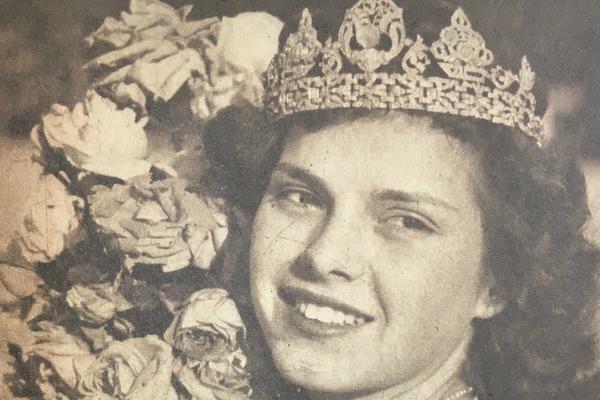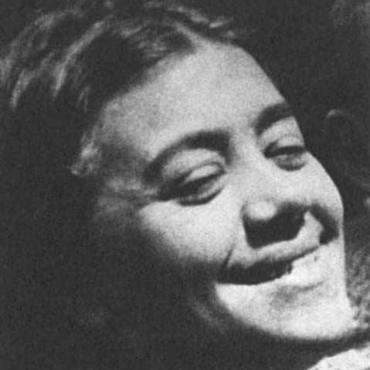“In the Bedroom”
By Yehudis, translated by Jordan Finkin
Yehudis (penname of Rokhl Bernshteyn, 1869–1942) was a poet, playwright, memoirist, and short story writer from Minsk. Known for vivid descriptions in evocative language, her work ranged over a wide variety of themes, from the domestic life of women to evaluations of the art of poetry. An important woman’s voice in Yiddish literature, her work has largely passed out of notice. “In the Bedroom” (In shloftsimer) was published in a 1908 Passover collection edited by Hersh Dovid Nomberg. This sketch deals with a sleepover among two young women and recounts a conversation between them one night before they go to sleep. It is a frank and intimate portrait of the inner dimension of these women’s desires. We can feel them strain against the restrictions of social convention, especially as those restrictions impinge on their romantic lives and longings. Yehudis plays with the idea of liberation and freedom at the core of Passover, and allows these women’s private speech to highlight the ironic contrast.
—Jordan Finkin
***
“Ah . . .” Mirel sighed as she snuggled her whole body into one of the two beds, wrapping herself in the covers. “So nice . . . Unusual beds you’ve got; so wide and soft. I love a bed like this. And your blankets are nice and warm, too.”
“You like them? Really?” said Gine.“I like to be good and tucked in, with just a bit of my hand or foot sticking out, so I can feel a little breeze. Well, go to sleep, Mirele. I’ll put out the candle.”
“Good night,” Mirel answered from her bed.
“Mirele, could you shut the window? It’s windy and I don’t want rain getting in overnight. The trees are really rustling.”
“Leave it open for a bit. I’ll close it, don’t worry. There won’t be any rain,” Mirel said, pressing her hand to the windowpane. “The sky is so clear and the moon so peculiarly mild. Who cares if a breeze frolics a bit and scares people.”
“You think?”
“Like velvet is your body
Your kiss like fire burns,”
Mirel crooned quietly to herself and then burst out laughing. “Gine, are you asleep? Get this, Sarah just found someone to surrender her sanctum to, her innocence which she was guarding so daintily. Till her hair turned grey, ha! Oh, what a virtuous soul!”
“Why are you laughing, Mirele? You think old people can’t love?”
“Oh, no, I don’t think that. Just the opposite. I like to think of her first hot breaths, and for him—oh, the unfortunate man—hot breaths, wild kisses, and moldy innocence, ha-ha!”
“Gosh, the way you talk.” Gine scolded
“Do my words shock you? Not so elegant? You prefer holy talk!”
“So you’ve got a fiancé yourself, Mirel?”
“A sweetheart? Yes, no harm in that. A sweetheart for a while,” Mirel laughed.
“Stop talking nonsense.”
“It’s not nonsense. Love’s only worth it for a while; longtime love is sad. You see, love spoils when it lasts too long, it turns sour, moldy.”
“How old are you, Mirele?”
“You’re worried about my innocence? Too late. I lost that a long time ago.”
“What do you mean by that?” Gine asked as she sat down.
“Don’t be afraid, my little kitten, a pair of fine strong arms took it from me. An electrical current passed from those arms right through me. I felt something new. I stared so searchingly into those eyes, as if I might discover the secret of my new feeling.”
“What play is that from? What role are you playing?”
“My own. I’m being serious.”
“You loved? And now?”
“Did I love, you ask? Yes, I loved. Myself. You see, I loved myself, my feeling, my pleasure.”
“Mirel, are you being serious? I don’t understand that kind of love. A young girl doesn’t love that way. She loves spiritually. Physical love comes next, eventually, unnoticed. A young girl can’t be the object of suspicion . . . I remember I was still young. My love for Dovid was an accident. Were I to meet a woman with his qualities, I thought, I would also love her in earnest . . . I loved listening to him talk for hours on end. He understood everything so cleverly, so deeply. My own desire was to understand Dovid, to be like him.”
“Oh, saintly Magdelene, eh?” Mirel cut in. “Was your god Dovid as saintly as you?”
“I remember his first kiss: he brushed his lips against my forehead the way one touches a delicate flower still wet with dew. I didn’t feel his kiss; I only felt him becoming closer to me, more beloved.”
“And then?”
“Then everything went naturally. I didn’t realize how close we had become.”
“Well, what became of your spiritual love?”
Gine answered:
___________
“I recall one evening. It was spring, the eve of Passover, late in the evening. We were alone in my room. No fire burning, only a full, bright moon shining in through the window and bathing us in pale light. I clung to Dovid, looked into his eyes, caressed his face. ‘Am I yours?’ I asked him as he drew me to him and embraced me. He didn’t answer, just pressed me closer to him.
‘I’m yours,’ my lips moved. ‘Yours, right?’
‘Mine. My little wife,’ he answered me and sprinkled my face with kisses.
‘My own, my man,’ rushed from my heart. I couldn’t say anything else, my heart was so full of such a wonderful feeling. I felt I was capable of the greatest sacrifice if only it would please Dovid. It might only have been my imagination but the moon seemed to be closer now, beaming in at us. I felt an urge to be outside, under the fresh heaven, near rejuvenated nature. ‘Come outside,’ I said to him, jumping up. That was a wonderful evening. It might have been the true springtime of my life. ‘Listen how freely the little streams flow among the stones in the gutters,’ I said to Dovid when we were out in the street. ‘They murmur so beautifully.’ Oh, those dainty little streams! How close, how dear they were to me that evening! I felt something new flowing within me, something fresh; I felt I was flowing with them, so unfettered and carefree. It was quiet in the street, but here and there you could catch a tune from the Haggadah. We started walking and walking, looking up at the sky, watching the stars in silence.
‘Come to our place,’ Dovid suggested. ‘Come to our seder.’
‘You want me to?’ I asked, snuggling up to him.
I was like a sun then at Dovid’s house. Everyone’s eyes were trained on me as if wanting to warm up around me. They looked so lovingly at me, so friendly. I felt it and smiled happily.
‘Reyzele,’ I said to Dovid’s little sister, calling her over to the side. ‘You see my petticoat? Do you like it?’ I was wearing a black petticoat with rose frill.
‘Oh, yes!’ she replied, her little eyes beaming.
‘And do you like me?’ I asked her and burst out laughing like a child.
‘What are you laughing about, Gine?’ Dovid asked as he came over to us.
‘How should I know? Just laughing,’ I answered.
I will never forget the look on his face at that moment. It was a promise of so much happiness. On the way back home Dovid said, ‘My family just now noticed how lovely you are.’
‘You think I’m lovely?’ I asked him, staring into his face, rapt.
He answered my question with a kiss. But now I understand why they put a garland on the bride at a wedding — they think she needs to be happy. Had there been a myrtle garland upon my head that evening it would have suited me perfectly. I was so, so happy . . .”
__________
“I was so, so happy,” Mirel repeated, her voice echoing in the room. “And then?”
Lightning flashed outside the window, bleaching the room.
“Ah, I’ve gone on too long. I just wanted to tell you that you’ve got yourself the wrong way round in your feelings. You give them too wild a coloration. Or maybe I misunderstood you, Mirele?”
“I don’t know. Understand it however you want. Call it spiritual or physical — either way I’ve loved! He was beautiful, young and strong—isn’t that enough for you? An aroma of vitality clung to him, beckoning me, pulling me toward him like a magnet. His proud, ardent gaze set my blood burning. And, as if bathed in a thick rose-colored paint, I wanted to say to him: You want my beauty, take me!”
“You loved!? And now?”
“There was a forested mountain near us” Mirel went on, “covered with tall, young trees that seemed to reach the sky. The two of us used to go there at the same time every day even though we never arranged it. ‘Miriam!’ he once called out when he noticed me from a distance in the valley. His strong, clear voice rang in the air with a silvery tone. I looked up, our eyes met. Among the tall, muted trees he seemed to me like some mysterious, higher being; the look on his face burned with an extraordinary fire of life.
“He ran towards me. A moment later and I was aloft in his arms. Instinctively I wrapped my arms around his neck, squeezing with my whole body. An immense warmth spread through my every limb. I felt like letting everything else fall away. At that moment we shared a single feeling, a single desire. We were one person.”
“Are you serious? And then?”
“Then? Then the summer was over. The sun hid itself away and our little mountain with its trees turned gloomy. Instead of their lovely conversation, all you could hear was the dry rustling of the yellow leaves.”
“That was your first love?”
“The first and so far the last,” Mirel laughed again.
“Lord help you. It seems to me one only loves once. The rest, the ones that follow, are but a repetition of the first, just in a different form.”
“You’re wrong” Mirel said. “Each love has its own particular beauty. Imagine: every day a fresh, newborn sun and a rejuvenated earth—every day a fresh, newborn love, a rejuvenated soul.”
“That sounds strange to me.”
“Ponder it and you’ll understand.”
“Why? I feel . . .” Gine paused when someone upstairs opened a window. “Sh, people are talking.”
“Who do you think it could be?” Mirel asked quietly.
“I don’t know. Every sound at night echoes weirdly, as if telling some secret.”
“What do you think, who is it?” Mirel asked again.
“What difference would it make?”
“Don’t say that. It does matter whether it’s an old man or a young one, or maybe even an old woman!” Mirel laughed. “What do old people think about when they can’t sleep?”
“Sh. Don’t laugh so wildly. Why should I want to know what beautiful women feel when they get old?”
“People say that the pious ones recite Psalms all night long, while the not-so-pious ones . . . In about twenty-five years I’ll let you know how it really is.”
“You think of yourself as beautiful?”
“What do you think?”
“You can be pleasing.”
“ ‘As long as we’re young,’ right?”
“Oh, Mirele, the way you talk!”
“Well, go to sleep, Gine.”
*
It grew dark. A downpour. The room filled with the smell of rain. A few drops, separated from their comrades, dripped in through the window and fell where they might. A gurgle and cheerful rush of water could be heard.
Quiet. Through the wall came a muffled tick-tock, tick-tock.
Jordan Finkin is Rare Book and Manuscript Librarian at the Klau Library of Hebrew Union College in Cincinnati. A specialist in modern Jewish literatures, he is the author of several books as well as numerous scholarly essays and articles. His most recent book, Exile as Home, explores the work of the Yiddish poet Leyb Naydus. He is also the director of Naydus Press, a non-profit publisher of Yiddish literature in translation.




